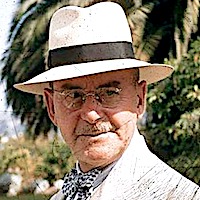

Tao Te Ching

photographer unknown
Thomas Mann
1875 – 1955 CE
Deep, psychologically insightful author
Novelist, social critic, philanthropist, and 1929 Nobel Prize winner; Thomas Mann became one of the most effective German refugees writing in opposition to Hitler and the Nazi regime in Germany. He became an American citizen and produced many anti-Nazi radio broadcasts in German for the BBC; but, in spite of that, became a target for McCarthyism, had to testify before the House Un-American Activities Committee, and was forced to stop his work for the Library of Congress, and return to Europe. His commentaries on American culture of the time being similar to "how it started in Germany." Mann carried on the philosophical tradition of Goethe, Nietzsche and Schopenhauer; passed it on to writers like Joseph Heller, Yukio Mishima, and Hermann Hesse.Lineages
Central European
Eras
Western
Post-Romantic Age (1850 – 2018 CE)Gilded Age (1860 – 1900 CE)
Great Depression (1929 – 1941 CE)
Victorian (1837 – 1901 CE)
Roaring Twenties (1920 – 1929 CE)
Chinese
Qing dynasty (1644 – 1912 CE)Unlisted Sources
An Appeal to Reason (1930)
"An Appeal to Reason" (1930)
"The War and the Future" (1940)
"This War" (1939)
An Appeal to Reason (1930)
Confessions of Felix Krull (1954)
Death in Venice (1924)
Freedom (1940)
Freud and the Future (1937)
Introduction to The Works of Schopenhauer
Mario and the Magician (1929)
New York Times article
The Beloved Returns (1939)
The Magic Mountain (1924)
The New Republic (1936)
Tonio Kröger (1903)
Quotes by Thomas Mann (40 quotes)
“There is an artistry so deep, so primordial and elemental, that no yearning seems to it sweeter and more worthy of tasting than that for the raptures of common-placeness.”
from Tonio Kröger (1903)
Comments: Click to comment
“What we call National-Socialism is the poisonous perversion of ideas which have a long history in German intellectual life.”
from "The War and the Future" (1940)
Comments: Click to comment
“Tolerance becomes a crime when applied to evil.”
from The Magic Mountain (1924)
Comments: Click to comment
“Unhappy German nation, how do you like the Messianic role allotted to you, not by God, nor by destiny, but by a handful of perverted and bloody-minded men?”
from "This War" (1939)
Comments: Click to comment
“Fanaticism turns into a means of salvation, enthusiasm into epileptic ecstasy, politics becomes an opiate for the masses, a proletarian eschatology; and reason veils her face.”
from "An Appeal to Reason" (1930)
Comments: Click to comment
“The ancients adorned their sarcophagi with the emblems of life and procreation, and even with obscene symbols... These men knew how to pay homage to death. For death is worthy of homage as the cradle of life, as the womb of palingenesis.”
from The Magic Mountain (1924)
Comments: Click to comment
“[the German anti-Semitic campaign] is aimed, essentially, not at the Jews at all, or at them exclusively. It is aimed at Europe and at the real spirit of Germany.”
from The New Republic (1936)
Comments: Click to comment
“I hold that we shall one day recognize in Freud’s life-work the cornerstone for the building of a new anthropology and therewith of a new structure, to which many stones are being brought up today, which shall be the future dwelling of a wiser and freer humanity.”
from Freud and the Future (1937)
Comments: Click to comment
“One always has the idea of a stupid man as perfectly healthy and ordinary, and of illness as making one refined and clever and unusual.”
from The Magic Mountain (1924)
Comments: Click to comment
“There is something suspicious about music, gentlemen. I insist that she is, by her nature, equivocal. I shall not be going too far in saying at once that she is politically suspect.”
Comments: Click to comment
“Time cools, time clarifies, no mood can be maintained quite unaltered through the course of hours.”
from The Magic Mountain (1924)
Comments: Click to comment
“A man lives not only his personal life, as an individual, but also, consciously or unconsciously, the life of his epoch and his contemporaries.”
from The Magic Mountain (1924)
Comments: Click to comment
“in perpetual conflict for possession of the world: force and justice, tyranny and freedom, superstition and knowledge; the law of permanence and the law of change, of ceaseless fermentation issuing in progress.”
from The Magic Mountain (1924)
Comments: Click to comment
“All moral discipline, all moral perfection derived from the soul of literature, from the soul of human dignity, which was the moving spirit of both humanity and politics... civilization!”
from The Magic Mountain (1924)
Comments: Click to comment
“it ended apparently in the triumph of chastity. Love was suppressed, held in darkness and chains, by fear, conventionality, aversion, or a tremulous yearning to be pure.... But this triumph of chastity was only an apparent, a pyrrhic victory.”
from The Magic Mountain (1924)
Comments: Click to comment
“It is not good when people no longer believe in war. Pretty soon they no longer believe in many other things which they absolutely must believe in if they are to be decent men.”
from An Appeal to Reason (1930)
Comments: Click to comment
“I stand between two worlds, am at home in neither, and in consequence have rather a hard time of it.”
from An Appeal to Reason (1930)
Comments: Click to comment
“We are most likely to get angry and excited in our opposition to some idea when we ourselves are not quite certain of our own position, and are inwardly tempted to take the other side.”
from An Appeal to Reason (1930)
Comments: Click to comment
“[Nietzsche's] personal feelings initiate him into those of the criminal ... in general all creative originality, all artist nature in the broadest sense of the word, does the same... an artist must approach his work in the spirit of the criminal about to commit a crime.”
Comments: Click to comment
“but after all and above all it depends on who is diseased, who mad, who epileptic or paralytic: an average dull-witted man, in whose illness any intellectual or cultural aspect is non-existent; or a Nietzsche or Dostoyevsky. In their case something comes out in illness what is more important and conductive to life and growth than any medical guaranteed health or sanity... in other words: certain conquests made by the soul and the mind are impossible without disease, madness, crime of the spirit.”
from An Appeal to Reason (1930)
Comments: Click to comment
“Every reasonable human being should e a moderate Socialist.”
from New York Times article
Comments: Click to comment
“No one who learns to know himself remains just what he was before.”
Comments: Click to comment
“Nor is it possible to devote oneself to culture and declare that one is 'not interested' in politics.”
from Freedom (1940)
Comments: Click to comment
“An artist who has not a moral feeling for life is an impossibility... The artist is in reality the (ironical) mediator between the realms of death and life”
Comments: Click to comment
“Has the world ever been changed by anything save the thought and its magic vehicle the Word?”
from Freud and the Future (1937)
Comments: Click to comment
“The myth is the foundation of life; it is the timeless schema, the pious formula into which life flows when it reproduces its traits out of the unconscious...”
from Freud and the Future (1937)
Comments: Click to comment
“while in the life of the human race the mythical is an early and primitive stage, in the life of the individual it is a late and mature one.”
from Freud and the Future (1937)
Comments: Click to comment
“Hold fast the time! Guard it, watch over it, every hour, every minute!... Hold every moment sacred. Give each clarity and meaning, each the weight of thine awareness, each its true and due fulfillment.”
from The Beloved Returns (1939)
Comments: Click to comment
“What a glorious gift is imagination, and what satisfaction it affords!”
from Confessions of Felix Krull (1954)
Comments: Click to comment
“Only he who desires is amiable and not he who is satiated.”
from Confessions of Felix Krull (1954)
Comments: Click to comment
“Solitude gives birth to the original in us, to beauty unfamiliar and perilous—to poetry.”
from Death in Venice (1924)
Comments: Click to comment
“. . . passion paralyses good taste and makes its victim accept with rapture what a man in his senses would either laugh at or turn from with disgust.”
from Death in Venice (1924)
Comments: Click to comment
“His work raises the familiar to a new, spiritual level, which may be termed revolutionary, not in a direct political or social, but in a psychological, poetic sense; it is truly and authentically open and sensitive to the future.”
Comments: Click to comment
“Habituation is a falling asleep or fatiguing of the sense of time; which explains why young years pass slowly, while later life flings itself faster and faster upon its course.”
from The Magic Mountain (1924)
Comments: Click to comment
“Music quickens time, she quickens us to the finest enjoyment of time.”
from The Magic Mountain (1924)
Comments: Click to comment
“Opinions cannot survive if one has no chance to fight for them.”
Comments: Click to comment
“Truth and beauty must always be referred the one to the other. Each by itself, without the support given by the other, remains a very fluctuating value. Beauty without truth on its side would be an empty chimaera”
from Introduction to The Works of Schopenhauer
Comments: Click to comment
“Freedom exists, and also the will exists; but freedom of the will does not exist.”
from Mario and the Magician (1929)
Comments: Click to comment
“Not to want to do something is a mental content impossible to live on.”
from Mario and the Magician (1929)
Comments: Click to comment
Quotes about Thomas Mann (1 quotes)

“Mann has the high and now seldom encountered liberal virtue of elevating any discussion to another plane — of writing as if men were reasoning creatures, even if the evidence points to the contrary.”
Comments: Click to comment
Comments (0)